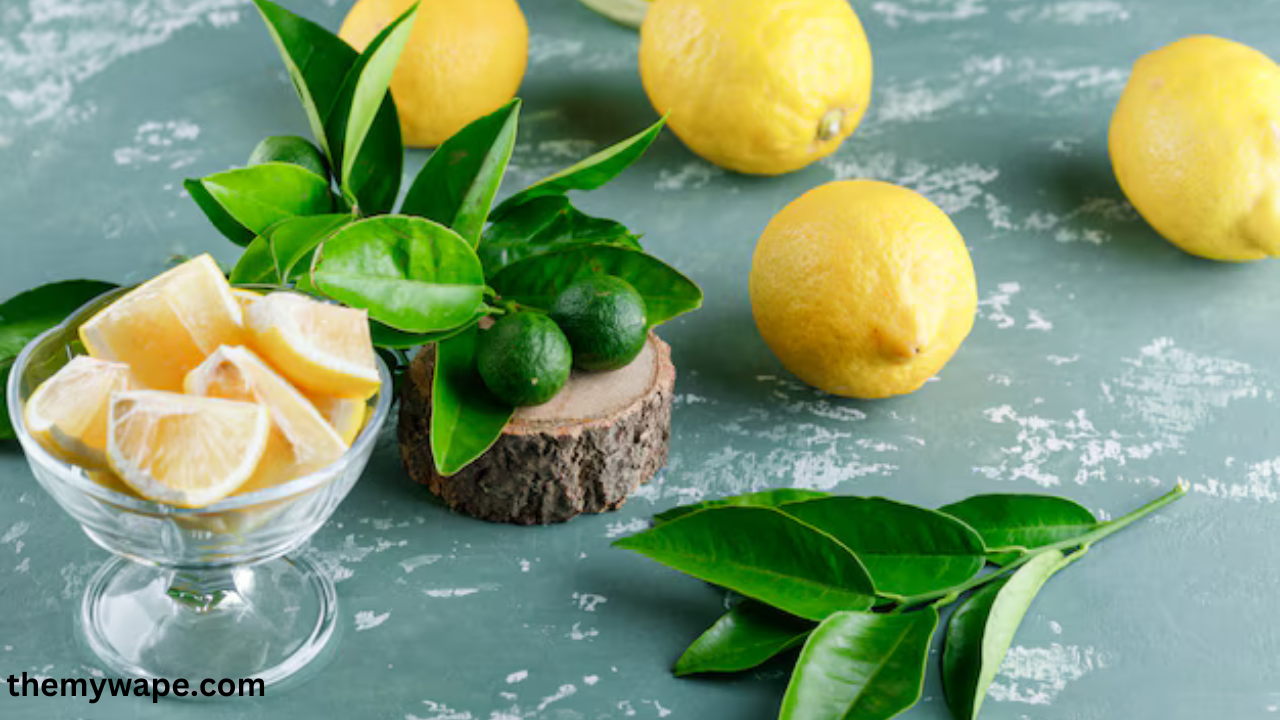Introduction
What are your thoughts on lemons? Probably the fruit itself, with its tangy flavor and vibrant yellow color. But did you know that lemon leaves are just as valuable? Often overlooked, lemon leaves offer a wide range of benefits and uses, from culinary delights to health-boosting properties. In this article, we’ll dive deep into the world of lemon leaves, exploring everything you need to know about their benefits, uses, and more.
Table of Contents
Nutritional Value of Lemon Leaves
Lemon leaves are packed with nutrients that contribute to overall well-being. They contain essential vitamins like vitamin C, vitamin A, and various B vitamins. Additionally, lemon leaves are rich in minerals such as calcium, potassium, and magnesium, which are crucial for maintaining a healthy body. The leaves also contain powerful antioxidants that help combat oxidative stress and inflammation.
Vitamins and minerals found in lemon leaves
Lemon leaves are a hidden gem when it comes to nutritional content. With their high levels of vitamin C, they provide a natural immune boost. The presence of vitamin A supports vision health, while B vitamins are essential for energy production and brain function.
Antioxidant Properties
Antioxidants in lemon leaves, such as flavonoids, help fight off free radicals that can cause cellular damage. This makes lemon leaves a valuable addition to your diet if you’re looking to promote overall health and prevent chronic diseases.
Health Benefits of Lemon Leaves
Lemon leaves have been used in traditional medicine for centuries due to their numerous health benefits. Let’s take a closer look at some of the most notable ones.
Boosting Immunity
Thanks to their high vitamin C content, lemon leaves can help strengthen your immune system. Regular consumption of lemon leaf tea or extracts can help your body fight off infections and illnesses.
Reducing Inflammation
Inflammation is a common cause of various chronic diseases. Lemon leaves possess anti-inflammatory properties that can help reduce swelling, pain, and other inflammatory symptoms.
Supporting digestive health
Lemon leaves can be an excellent remedy for digestive issues. They help soothe the stomach, relieve bloating, and even alleviate symptoms of indigestion.
Lemon Leaf in Traditional Medicine
Lemon leaves have long been used in traditional medicine systems like Ayurveda, Traditional Chinese Medicine (TCM), and folk remedies across the world.
Ancient Uses Cultures
From India to the Mediterranean, lemon leaves have been revered for their healing properties. They were often used to treat respiratory issues, skin conditions, and digestive problems.
Modern Applications
Today, lemon leaves are still used in herbal medicine, often in the form of teas, oils, or extracts. They are commonly recommended for their calming effects, helping to relieve anxiety and stress.
Culinary Uses of Lemon Leaves
Lemon leaves bring a subtle citrusy aroma and flavor to dishes. “They have a wide range of uses in cooking, suitable for both sweet and savory dishes.
Lemon Leaf in Cooking and Baking
Whether you’re grilling meats or making desserts, lemon leaves add a fragrant touch that elevates the overall flavor. They are often used to wrap foods before cooking, infusing them with a zesty essence.
Popular dishes using lemon leaves
Some popular dishes that use lemon leaves include grilled fish wrapped in lemon leaves, lemon leaf custard, and Mediterranean-style stews.
Lemon leaves in herbal teas
Brewing lemon leaves into a calming herbal tea is one of the simplest and most effective ways to reap their benefits.
How to Prepare Lemon Leaf Tea
Preparing lemon leaf tea is simple. All you need is a handful of fresh or dried lemon leaves. Boil them in water for 5-10 minutes, then strain and enjoy. You can add honey or lemon juice for extra flavor.
Benefits of Drinking Lemon Leaf Tea
Drinking lemon leaf tea regularly can help with digestion, reduce stress, and improve overall well-being. It’s also a natural way to detoxify the body.
Using Lemon Leaves for Skin and Hair Care
Lemon leaves are not just for internal health; they also offer numerous beauty benefits.
Natural Remedies for Skin Issues
Lemon leaf extracts can be applied topically to treat acne, soothe rashes, and even out skin tone. The antibacterial properties help keep your skin clear and healthy.
Benefits for Hair Health
Lemon leaf rinses can add shine to your hair, reduce dandruff, and stimulate hair growth. You can easily make a lemon leaf-infused water to rinse your hair after shampooing.
Aromatic and Decorative Uses
Lemon leaves are not only functional but also add beauty and aroma to your home.
Lemon Leaves in Potpourri
Add lemon leaves to your homemade potpourri for a refreshing citrus scent that lingers in your living spaces.
Home Decoration Ideas with Lemon Leaves
Use fresh lemon leaves as natural decor. They make elegant table settings, wreaths, or even garlands for special occasions.
Growing and Harvesting Lemon Leaves
If you’re lucky enough to have a lemon tree, you can grow your own lemon leaves for endless uses.
How to Grow Lemon Trees for Leaf Harvesting
Lemon trees thrive in sunny environments with well-drained soil. Ensure that they receive adequate water and nutrients for healthy leaf growth.
Tips for Proper Harvesting and Storage
Harvest lemon leaves when they are vibrant and green. Store them in a cool, dry place or freeze them to retain their freshness.
Environmental Benefits of Lemon Leaves
Lemon trees and their leaves play a crucial role in maintaining a healthy environment.
Role in Air Purification
Lemon trees help purify the air by absorbing pollutants and releasing oxygen, making them great additions to gardens and indoor spaces.
Promoting biodiversity in gardens
Lemon trees attract beneficial insects and birds, contributing to biodiversity and a balanced ecosystem.
Precautions and Potential Side Effects
While lemon leaves are generally safe, there are a few precautions to consider.
Who should avoid using lemon leaves?
Pregnant women, young children, and individuals with certain allergies should consult a healthcare provider before using lemon leaves.
Possible allergic reactions
Some people may experience mild allergic reactions like skin irritation or respiratory issues when exposed to lemon leaves. If you notice any adverse effects, discontinue use immediately.
How to Choose Quality Lemon Leaves
When it comes to choosing lemon leaves, freshness matters.
Fresh vs. Dried Leaves: Which Is Better?
Fresh lemon leaves are ideal for most uses, but dried leaves are more convenient and have a longer shelf life.
Where to Buy Lemon Leaves
You can find lemon leaves at specialty grocery stores, online retailers, or even farmers’ markets. Just ensure they are organic and pesticide-free.
DIY Recipes using Lemon Leaves
Lemon leaves can be incorporated into various DIY projects at home.
Homemade Lemon Leaf Oil
Infuse a carrier oil with lemon leaves to create a fragrant, multipurpose oil that can be used for massage, skincare, or aromatherapy.
DIY Lemon Leaf Face Mask
Crush fresh lemon leaves and mix with yogurt and honey for a natural face mask that brightens and nourishes your skin.
Sustainability and ethical sourcing
It’s important to consider sustainability when purchasing lemon leaves.
Environmental Impact of Lemon Leaf Farming
Opt for leaves sourced from sustainable farms that minimize chemical use and promote eco-friendly practices.
Supporting Ethical Growers
Encourage small-scale farmers and local businesses that focus on ethical sourcing and fair labor practices.
Conclusion
Lemon leaves are a versatile and valuable resource with a multitude of benefits, from health and wellness to culinary and decorative uses. Whether you’re enjoying a warm cup of lemon leaf tea, creating a natural beauty remedy, or enhancing your cooking, these leaves are a fantastic addition to your daily routine. Embrace the power of lemon leaves and discover the difference they can make in your life.
FAQs
Can lemon leaves be eaten? Yes, lemon leaves can be used in cooking and are safe to consume when properly prepared.
How do you store lemon leaves? Store fresh lemon leaves in the refrigerator or freeze them. Dried leaves can be kept in an airtight container in a cool, dry place.
Are lemon leaves good for weight loss? Lemon leaf tea may aid in digestion and detoxification, which can support weight loss efforts.
What does lemon leaf tea taste like? Lemon leaf tea has a mild citrus flavor with a hint of bitterness.
Can I use lemon leaves for skincare? Yes, lemon leaves have antibacterial and anti-inflammatory properties that are beneficial for the skin.
You can see the latest updates on : MyWape



